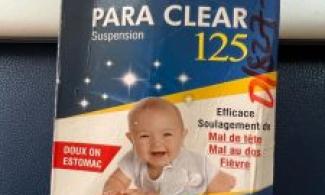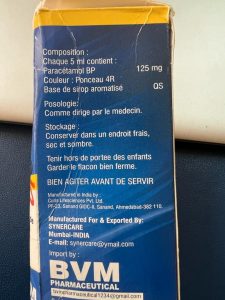
Nigeria's National Agency for Food and Drug Administration and Control (NAFDAC) on June 12 raised an alarm in a statement on its website that the paracetamol suspension - Para Clear Suspension 125, received from Liberian Medicine and Health Product Regulatory Authority for laboratory testing in its Central Drug Control Laboratory (CDCL) was found to be toxic.
Indian drugmaker and director at Curis Lifesciences based in the Western Indian city of Ahmedabad, Jaimik Patel, has insisted that the paracetamol syrup he produced that was exported to Liberia in 2022 is not toxic.
Nigeria's National Agency for Food and Drug Administration and Control (NAFDAC) on June 12 raised an alarm in a statement on its website that the paracetamol suspension - Para Clear Suspension 125, received from Liberian Medicine and Health Product Regulatory Authority for laboratory testing in its Central Drug Control Laboratory (CDCL) was found to be toxic.
NAFDAC said, “Laboratory analysis of the sample confirms that the product contains toxic ethylene glycol, a toxic substance that is not expected in product formulations. The product also failed the requirement for acute oral toxicity with five deaths of the laboratory animals recorded.
"Diethylene glycol and ethylene glycol are toxic to humans when consumed and can prove fatal. Toxic effects can include abdominal pain, vomiting, diarrhoea, inability to pass urine, headache, altered mental state, and acute kidney injury which may lead to death."
But while Indian authorities launched their own investigation on the standard of the drug, Patel on Tuesday told Reuters that tests by a private Indian laboratory found the drug to be of "standard quality".
The drugmaker said, "There is no possibility at all of finding ethylene glycol or diethylene glycol in our product. We are challenging the claim that our product was toxic."
Reuters reports that a test of a sample of the medicine conducted by privately run Vaibhav Analytical Services in Ahmedabad on Saturday, and seen by Reuters, said the syrup had less than 0.1% of ethylene glycol and diethylene glycol.
"The sample referred ... IS OF standard quality," the test report from the Ahmedabad-based laboratory said.
According to the World Health Organisation (WHO), trace amounts of less than 0.1% of ethylene glycol and diethylene glycol in medicines are not considered toxic.
Patel said officials from India's federal drug regulator, the Central Drugs Standard Control Organisation, also picked up the sample for their own investigation. He said Curis had shared the test results and other documents with the regulator and the WHO.
Mumbai-based drug exporter Synercare told Reuters it had shipped two batches of nearly 20,000 Curis-made Para Clear bottles each to Liberia in October.
Synercare's exports manager Dipesh Ajmera and Patel said Liberian authorities have now revoked the permission for the sale of all Curis products, including painkillers paracetamol and ibuprofen and antibiotic medication azithromycin.
Ajmera said Liberian authorities were set to destroy one batch of the paracetamol syrup last year as the drug's colour did not match that of a comparable product.
Anmera added that the paracetamol suspension was supposed to be reddish brown but on physical verification, it was found to be reddish pink.
Head of the Liberia Medicines and Health Products Regulatory Authority, Keturah Smith-Chineh, told Reuters that the syrups were to be incinerated because of the colour variation but it was tested in Nigeria at the request of the medicine's local importer.
"We plan to incinerate all the ... stock that came into Liberia," she said. "There are two other child medications from that manufacturer and we are working on recalling them."
Many Indian-made drugs have been found to contain ethylene glycol and similar toxin diethylene glycol since last year, which the WHO has linked to the deaths of dozens of children in Gambia and Uzbekistan.
The toxins are commonly used in brake fluid and other products not meant for human consumption.
